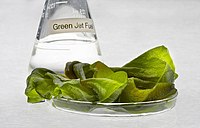
Photo from wikipedia
Soil salinity, a major environmental concern, significantly reduces plant growth and production all around the world. Finding solutions to reduce the salinity impacts on plants is critical for global food… Click to show full abstract
Soil salinity, a major environmental concern, significantly reduces plant growth and production all around the world. Finding solutions to reduce the salinity impacts on plants is critical for global food security. In recent years, the priming of plants with organic chemicals has shown to be a viable approach for the alleviation of salinity effects in plants. The current study examined the effects of exogenous ethanol in triggering salinity acclimatization responses in soybean by investigating growth responses, and numerous physiological and biochemical features. Foliar ethanol application to saline water-treated soybean plants resulted in an enhancement of biomass, leaf area, photosynthetic pigment contents, net photosynthetic rate, shoot relative water content, water use efficiency, and K+ and Mg2+ contents, leading to improved growth performance under salinity. Salt stress significantly enhanced the contents of reactive oxygen species (ROS), malondialdehyde, and electrolyte leakage in the leaves, suggesting salt-induced oxidative stress and membrane damage in soybean plants. In contrast, ethanol treatment of salt-treated soybean plants boosted ROS-detoxification mechanisms by enhancing the activities of antioxidant enzymes, including peroxidase, ascorbate peroxidase, catalase, and glutathione S-transferase. Ethanol application also augmented the levels of proline and total free amino acids in salt-exposed plants, implying a role of ethanol in maintaining osmotic adjustment in response to salt stress. Notably, exogenous ethanol decreased Na+ uptake while increasing K+ and Mg2+ uptake and their partitioning to leaves and roots in salt-stressed plants. Overall, our findings reveal the protective roles of ethanol against salinity in soybean and suggest that the use of this cost-effective and easily accessible ethanol in salinity mitigation could be an effective approach to increase soybean production in salt-affected areas.
Journal Title: Plants
Year Published: 2022
Link to full text (if available)
Share on Social Media: Sign Up to like & get
recommendations!